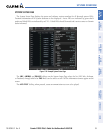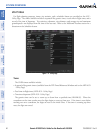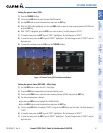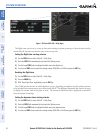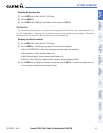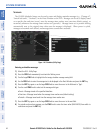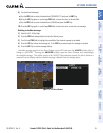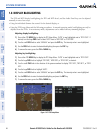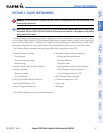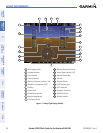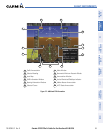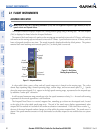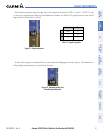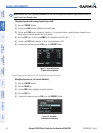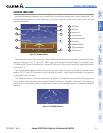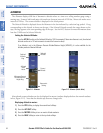
190-00595-01 Rev. B
Garmin G1000 Pilot’s Guide for the Beechcraft A36/G36
47
FLIGHT INSTRUMENTS
SYSTEM
OVERVIEW
FLIGHT
INSTRUMENTS
EIS
AUDIO PANEL
& CNS
FLIGHT
MANAGEMENT
HAZARD
AVOIDANCE
AFCS
ADDITIONAL
FEATURES
APPENDICES INDEX
SECTION 2 FLIGHT INSTRUMENTS
WARNING: In the event that the airspeed, attitude, altitude, or heading indications become unusable, refer
to the backup instruments.
NOTE: The Automatic Flight Control System (AFCS) provides additional readouts and bugs on selected flight
instruments. Refer to the AFCS Section for details on these bugs and readouts, as they appear on the display
during certain AFCS modes.
Increased situational awareness is provided by replacing the traditional instruments on the panel with an easy-
to-scan Primary Flight Display (PFD) that features a large horizon, airspeed, attitude, altitude, vertical speed, and
course deviation information. In addition to the flight instruments, navigation, communication, terrain, traffic,
and weather information are also presented on the PFD and explained in other sections of this Pilot’s Guide.
The following flight instruments and supplemental flight data are displayed on the PFD:
• Airspeed Indicator, showing
– True Airspeed
– Airspeed awareness ranges
– Reference flags
• Attitude Indicator with slip/skid indication
• Altimeter, showing
– Barometric setting
– Selected Altitude
• Vertical Deviation/Glideslope Indicators
• Vertical Speed Indicator (VSI)
• Vertical Navigation indications
• Horizontal Situation Indicator, showing
– Heading and course indications
– Turn Rate Indicator
– Navigation source
– Bearing pointers and information windows
– DME Information Window (optional)
– Course Deviation Indicator (CDI)
• DME Tuning Window (optional)
• Outside air temperature (OAT)
• System time
• Wind data
The PFD also displays various alerts and annunciations.



